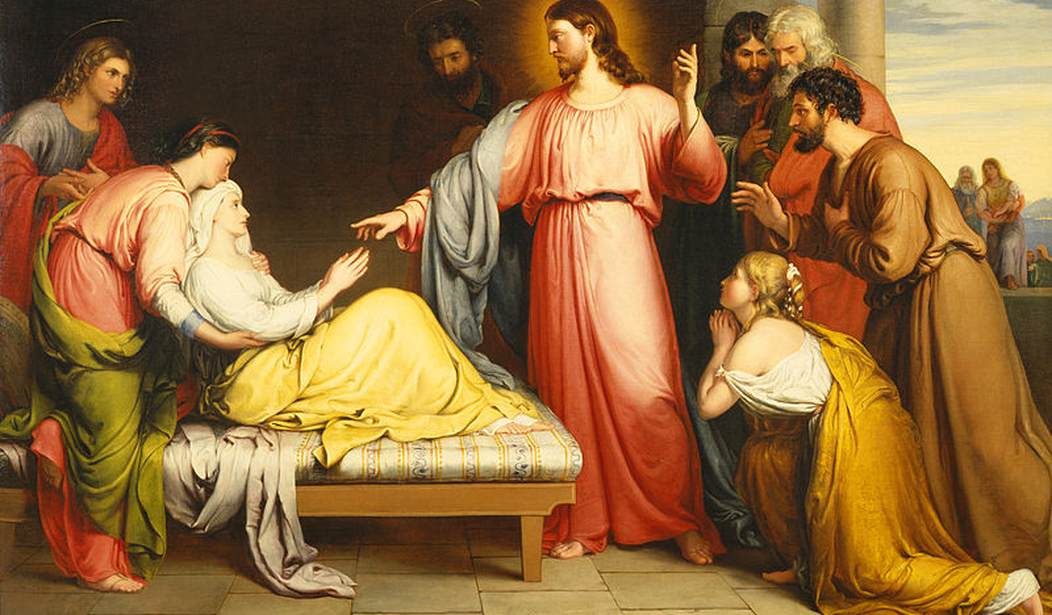This morning’s Gospel reading is Mark 1:29–39:
On leaving the synagogue Jesus entered the house of Simon and Andrew with James and John. Simon’s mother-in-law lay sick with a fever. They immediately told him about her. He approached, grasped her hand, and helped her up. Then the fever left her and she waited on them.
When it was evening, after sunset, they brought to him all who were ill or possessed by demons. The whole town was gathered at the door. He cured many who were sick with various diseases, and he drove out many demons, not permitting them to speak because they knew him.
Rising very early before dawn, he left and went off to a deserted place, where he prayed. Simon and those who were with him pursued him and on finding him said, “Everyone is looking for you.” He told them, “Let us go on to the nearby villages that I may preach there also. For this purpose have I come.” So he went into their synagogues, preaching and driving out demons throughout the whole of Galilee.
Earlier this week, I attended a retreat at my parish for those involved in music ministry. Due to the nature of liturgical ministries, we don’t get a chance to interact often with members of choirs for other Masses, so this was a fun opportunity to catch up and spend time with each other. The topic of this retreat was excellence, both practical and spiritual, and its effectiveness and purpose.
This topic hits close to home for music ministries and their volunteers, of course. Few disciplines require as much precision as music, vocal or otherwise. As our pastor reminded us (while offering gracious praise for our work), practical excellence requires a lot of preparation and work to achieve. We can’t just show up a couple of minutes before Mass and expect either practical excellence or spiritual effectiveness. “Winging it” may get you by occasionally, but even that only works if you have spent enough time doing the work to prepare for those “winging it” moments.
And that’s in terms of practical excellence. Spiritual excellence requires much more from us, both in terms of practical work and spiritual formation. Our path to salvation takes a lifetime of preparation, and not just in contemplation but in formation, both practical and spiritual.
We see this in all three of our readings today — the hard work and at times the drudgery of being a child of God. “Drudgery” is precisely the word used in our first reading from Job, in fact, as Job laments the life he must lead in the fallen world:
Is not man’s life on earth a drudgery? Are not his days those of hirelings? He is a slave who longs for the shade, a hireling who waits for his wages. So I have been assigned months of misery, and troubled nights have been allotted to me. If in bed I say, “When shall I arise?” then the night drags on; I am filled with restlessness until the dawn. My days are swifter than a weaver’s shuttle; they come to an end without hope. Remember that my life is like the wind; I shall not see happiness again.
This is a cry of despair, of hopelessness in the face of endless suffering more than it is a lament of hard work. Job became specifically afflicted as a test of mankind; in a way, Job is a foreshadowing of Christ, only without Jesus’ divine nature. Job complains and bitterly challenges the Lord, who then reminds Job of his place, but Job never stops loving the Lord even throughout his torment. Job finds himself in the end, thanks to his formation in God’s Word, and is recompensed in the end with the Lord’s beneficence.
In our second reading today, we get a different sense of “drudgery” in the Lord’s service. Paul professes in his first letter to the Corinthians that he has chosen slavery to the Church to spread the Gospel to them and others. “Although I am free in regard to all,” he writes, “I have made myself a slave to all so as to win over as many as possible.” Paul’s evangelization is almost legendary, launching churches all over Asia Minor and then in Rome itself along with Peter. Almost all of the Apostles spent their lives traveling the region to spread the Gospel to hostile populations; almost all of them were killed for doing so.
Does anyone imagine that these lives were anything but drudgery and pain? And yet, the Apostles willingly and joyfully performed these works, without any worldly benefit and despite the privations and suffering it caused. To any outsider, their lives could not possibly have been described as “excellent” in secular terms, either then or now. They died impoverished, tortured and killed by the people they longed to save, and so did generations of their successors.
But even apart from the martyrdom, these missions were just hard work. Today’s Gospel reminds us that even Jesus needed rest from the demands of a world hungry to find its way back to the Lord. We catch glimpses of it in other parts of the Gospel, too; The Chosen has a couple of good scenes depicting Jesus’ exhaustion from His healings. Later, Jesus sends the disciples on their own missions as a practice run for their work after His Ascension, which is yet another example of the need for preparation to get to spiritual excellence and effectiveness.
Many of us do not conceive of “salvation” as work, at least not on our part — and strictly speaking, it’s not. Salvation comes from the grace of Christ, and we need only to accept it. But that acceptance comes with the responsibility of allowing Christ to work through us, and to form ourselves to accomplish our small part of it. We are all called to His ‘Great Commission,’ spreading the joy and beauty of the Gospel to all the world, no less than the original Apostles. We are all called to encounter Jesus at the altar on the Lord’s day, to refresh us after our labors during the week and to form us for the drudgery to come afterward. Some of us are called to serve the rest of the community at that encounter we call Mass, either through music, reading, or other tasks to support the priest whose charism originated with the Apostles.
None of this is easy. Some of it takes hard work, preparation, commitment, and in some cases, drudgery. But if we form ourselves to His service, even the drudgery can be filled with joy and excellence.
Previous reflections on these readings:
- The darkness before the dawn: Sunday reflection
- Shaping the spiritual battleground: Sunday reflection
- Sunday reflection: Mark 1:29–39
The front-page image is “Christ Healing the Mother of Simon Peter’s Wife” by John Bridges, 1839. On display at the Birmingham Museum of Art. Via Wikimedia Commons.
“Sunday Reflection” is a regular feature, looking at the specific readings used in today’s Mass in Catholic parishes around the world. The reflection represents only my own point of view, intended to help prepare myself for the Lord’s day and perhaps spark a meaningful discussion. Previous Sunday Reflections from the main page can be found here.







Join the conversation as a VIP Member